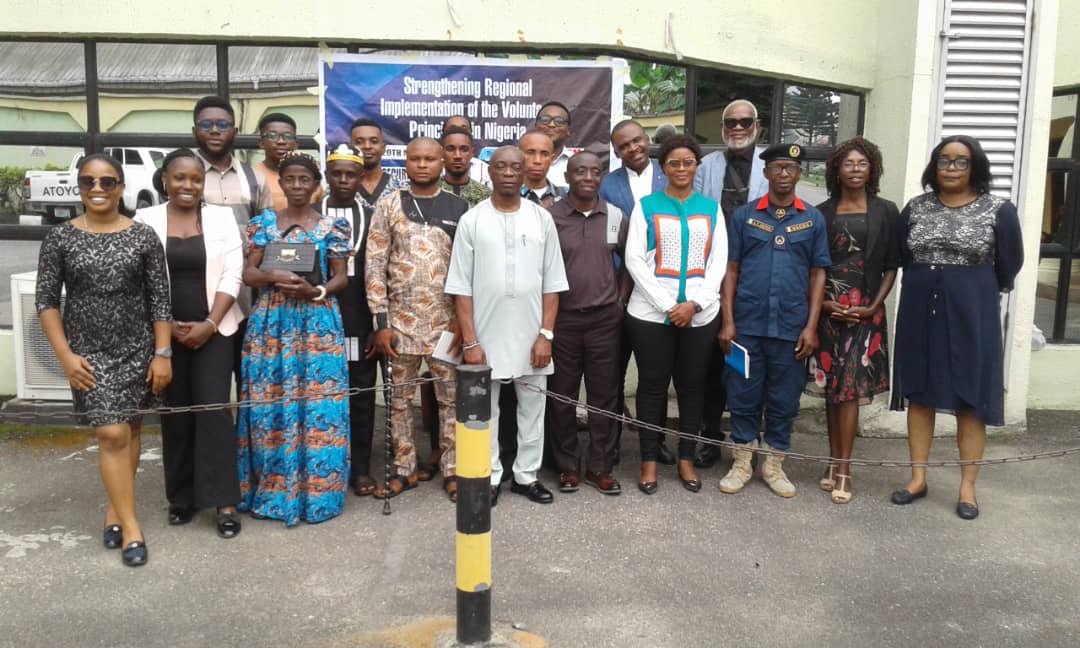LITE-Africa, PPDF Partner to End Human Rights Violations, Promote Ethical Security Practices

The fight against human rights violations received a further boost last week when the Leadership Initiative for Transformation and Empowerment, LITE-Africa, trained security experts and journalists on effective methods to address human rights abuses and promote ethical conduct within security operations.
LITE-Africa, a non-governmental organization focused on Governance & Human Rights, Sustainable Livelihoods & Health, and Humanitarian Support Services in the Niger Delta, conducted the workshop in partnership with the Peace Point Development Foundation (PPDF) at Eejmm Hotel, Uyo.
The one-day workshop centered on understanding the Voluntary Principles on Security and Human Rights (VPSHR) aimed to equip security personnel with the necessary knowledge, expose them to the historical development of law, and enhance their professional proficiency regarding the use of force in accordance with human rights standards and ethical conduct.
Participants drawn from both private and public security outfits were taken through practical examples and scenarios to illustrate human rights violations involving security operatives and to deepen their understanding of the importance of upholding ethical standards by security experts.
Key discussions centered around the fundamental principles of human rights, their universal applicability, and non-negotiable nature, as well as the characteristics of human rights and their histories, emphasizing the imperative to respect the dignity and freedoms of all individuals regardless of race, gender, or religious affiliation.
Speaking on why human rights are important to everyone, Madam Uloma Umozemke noted that “human rights are inherent to all human beings irrespective of a person’s race, age, sex, or religious beliefs, and are often expressed and guaranteed by law to promote and protect human rights and fundamental freedoms of individuals or groups.”
Madam Umozemke explained that these rights are universal and legally protected, giving every human the right to dignity, which cannot be taken away, separated, or waived, and are applicable to everyone without discrimination. She tasked security personnel to be cautious when dealing with issues of human rights violations.
She stressed that to uphold the dignity of human rights, security personnel should pay close attention, especially when dealing with vulnerable groups such as women, children, minority groups, and victims of crime or human trafficking, to avoid infringing on these rights and instead safeguard them by fostering an environment of inclusivity and protection.
While lamenting the many human rights abuses reported in her agency, Madam Umozemke, a representative of the National Human Rights Commission, Akwa Ibom State, shed light on the ethical behavior and codes of conduct expected from security operatives, citing the International Code of Conduct for Private Security Service Providers as a guiding framework.
Addressing misconduct and unethical behavior, the NHRC representative highlighted a systematic approach to recording, investigating, and reporting incidents, emphasizing accountability and transparency in dealing with breaches of conduct. She reminded security personnel of their duty to uphold human rights principles in line with international conventions and treaties ratified by Nigeria.
On his part, Dr. Innocent Adjenughure, who spoke extensively on the Anti-Torture Act 2017, explained that the tactics of torture employed by some security personnel when extracting information from people violate human rights. He stressed that Nigeria’s adherence to principles condemning torture, as outlined in the Constitution of the Federal Republic of Nigeria and various international agreements, mandates respect for the rights of all individuals, including suspects, detainees, and prisoners.
According to Adjenughure, the Nigerian constitution defines torture as any physical and mental forms of torture perpetrated by public officials or persons acting in an official capacity.” Physical torture includes beatings, deprivation of food, electric shocks, and submersion in polluted water, among other methods. Mental torture includes blindfolding, threats of harm, solitary confinement, prolonged interrogation, and maltreatment of family members.
He noted that international instruments such as the Universal Declaration of Human Rights, the International Covenant on Civil and Political Rights, and the UN Convention against Torture underscore the absolute prohibition of torture and cruel, inhuman, or degrading treatment or punishment on people, including suspects, detainees, and prisoners. He emphasized that no person placed under investigation or held in custody of any person in authority shall be subjected to physical harm, force, violence, threat, or intimidation, or any act that impairs his free will.
Adjenughure also stressed the legal and ethical considerations surrounding the use of force, with an emphasis on the PLAN principle – proportionality, legality, accountability, and necessity.
To end the culture of torture and human rights violations, respecting the rights of all individuals involved, understanding and applying relevant laws and regulations, maintaining professionalism in conduct, staying calm, assessing surroundings, establishing authority, positioning oneself strategically, and collaborating with team members to enhance effective communication were outlined as the five steps that could be used to apply force during security actions.






